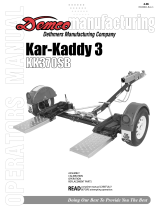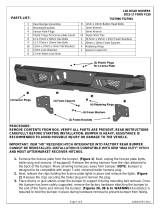
WARNING:
FAILURE TO FOLLOW THESE INSTRUCTIONS CAN RESULT IN LOSS OF TOWING VEHICLE CONTROL, SEPARATION
OF THE TOW BAR FROM THE TOWING VEHICLE, SEPARATION OF THE TOWED VEHICLE FROM THE TOW BAR,
CAUSING SEVERE PERSONAL INJURY, DEATH, OR PROPERTY DAMAGE.
NOTE: The dimensional variations between otherwise
identical vehicles can be considerable. Some minor
modifications may have to be made to ensure a
proper fit.
INSTALLATION INSTRUCTIONS
IMPORTANT INSTALLATION ITEMS
DEMCO products and accessories are intended to
be installed by professional installers with experi-
ence, proper equipment and the ability to do modifi-
cation work. Installers with these qualifications can
be found in RV and Automotive Service Centers.
If the car to be towed has been in an accident, the
chassis may be damaged in an area where the Base
Plate attaches. It may no longer be suitable for
towing. Extreme caution and careful examination
are required in such a situation. It is also likely, even
from a minor accident, that the hole alignment will be
more difficult due to hole alignment problems.
Many DEMCO Base Plates are designed to use
existing holes and hardware to mount the Base Plate
to the towed vehicle. Even though the bolt is there,
however, do not assume it is adequate for mounting
the Base Plate. Manufacturers make many changes
in hardware both within and between model years.
Be sure the bolt is long enough to protrude past the
nut a distance no less than 1/2 the diameter of the
bolt, after the Base Plate is mounted. The threads
should be in good condition. We require that
" Blue" be used on all bolts. If a new
bolt is required, be sure it is SAE Grade 5 or Metric
8.8.
1. Open hood and remove four plastic push fasteners.
Safety is of utmost importance at all times. There are several items
that must be checked each time before using and while using a tow
bar.
Before allowing anyone to hook up or operate a tow bar, be sure
they have read and understand the proper operating procedure.
DO NOT use worn or damaged cables and/or pins.
Be sure the SAFETY CABLES are hooked, chassis to chassis, to
both the towing and towed vehicles using the crisscross method.
Check clearance between vehicles in a turning situation.
Check base plate mounting bolts for tightness and frame for metal
fatigue.
Do not load the towed vehicle with anything as you may exceed the
towing capacity of the tow bar.
Keep fingers away from pivot points to prevent personal injury.
Be sure the steering components of the towed vehicle are properly
aligned.
NOTE: This unit can be backed up in moderate increments. Any
severe backwards cornering could result in damage to the Tow Bar
and/or towed vehicle chassis.
For automatic transmissions: Consult your vehicle owners
manual for towing suitability with the drive shaft connected. Other-
wise, the towed vehicle will have to be equipped with a transmis-
sion pump or drive shaft disconnect.
Check to make sure that all lights are in proper working order.
The information on towability of vehicles is reprinted with per-
mission of MotorHome
©
Magazine, and is believed to be reli-
able. However, Demco does not warrant the information to be
correct. Always consult your towed vehicle owner’s manual and
follow towing instructions. Each year, MotorHome
©
Magazine,
compiles a list of vehicles that can be towed four-down behind a
motorhome with no modifications required. This guide contains
only those vehicles that have been approved by their manufactur-
ers for towing. This list is enclosed with this manual.
Caution: MotorHome
©
Magazine left out any vehicles that
have towing speed limits slower than 55 m.p.h., or distance limits
of less than 200 miles. At a minimum, these vehicles require sig-
nificant modification, such as the use of an aftermarket product, to
make them towable. The availability of a Demco Tow Bar Base
Plate does not imply that these vehicles can be modified or that
there is an aftermarket product available. Refer to your vehicle
owner’s manual or consult your dealer to determine whether your
vehicle can be modified to make it towable. Failure to observe this
precaution could result in property damage or personal injury.
CAUTION












